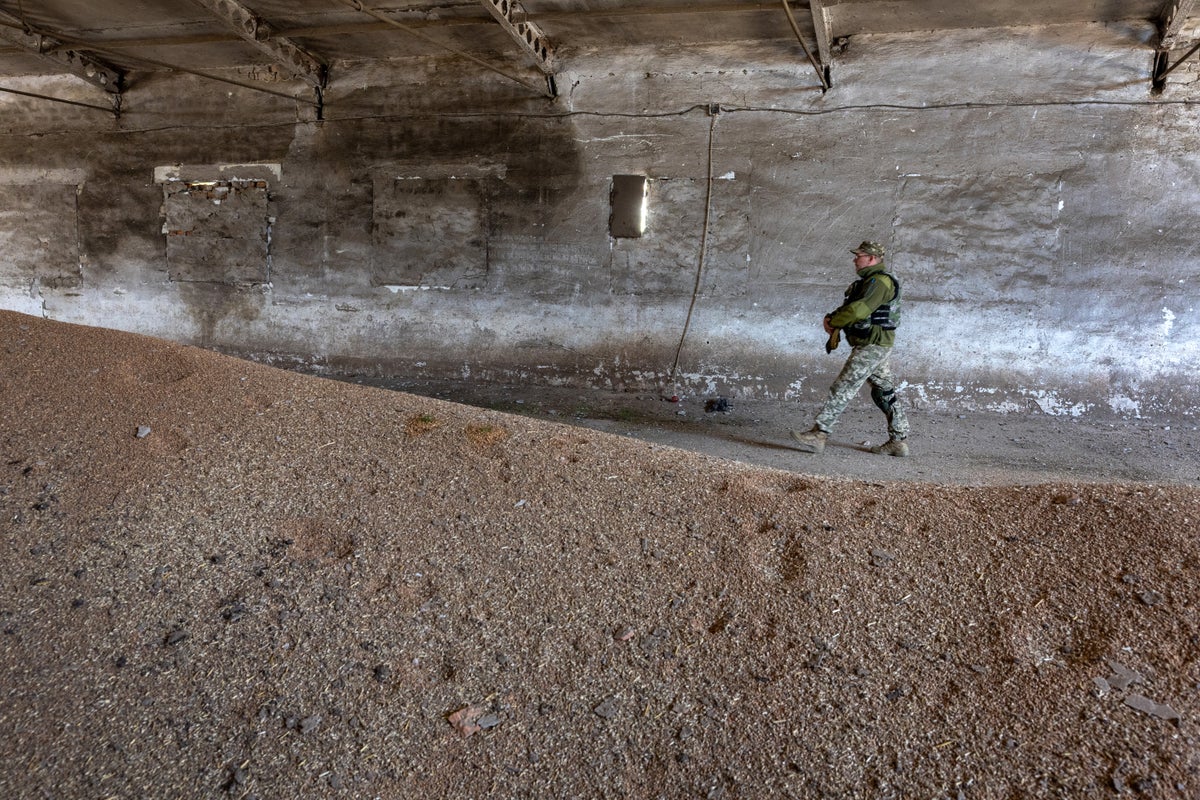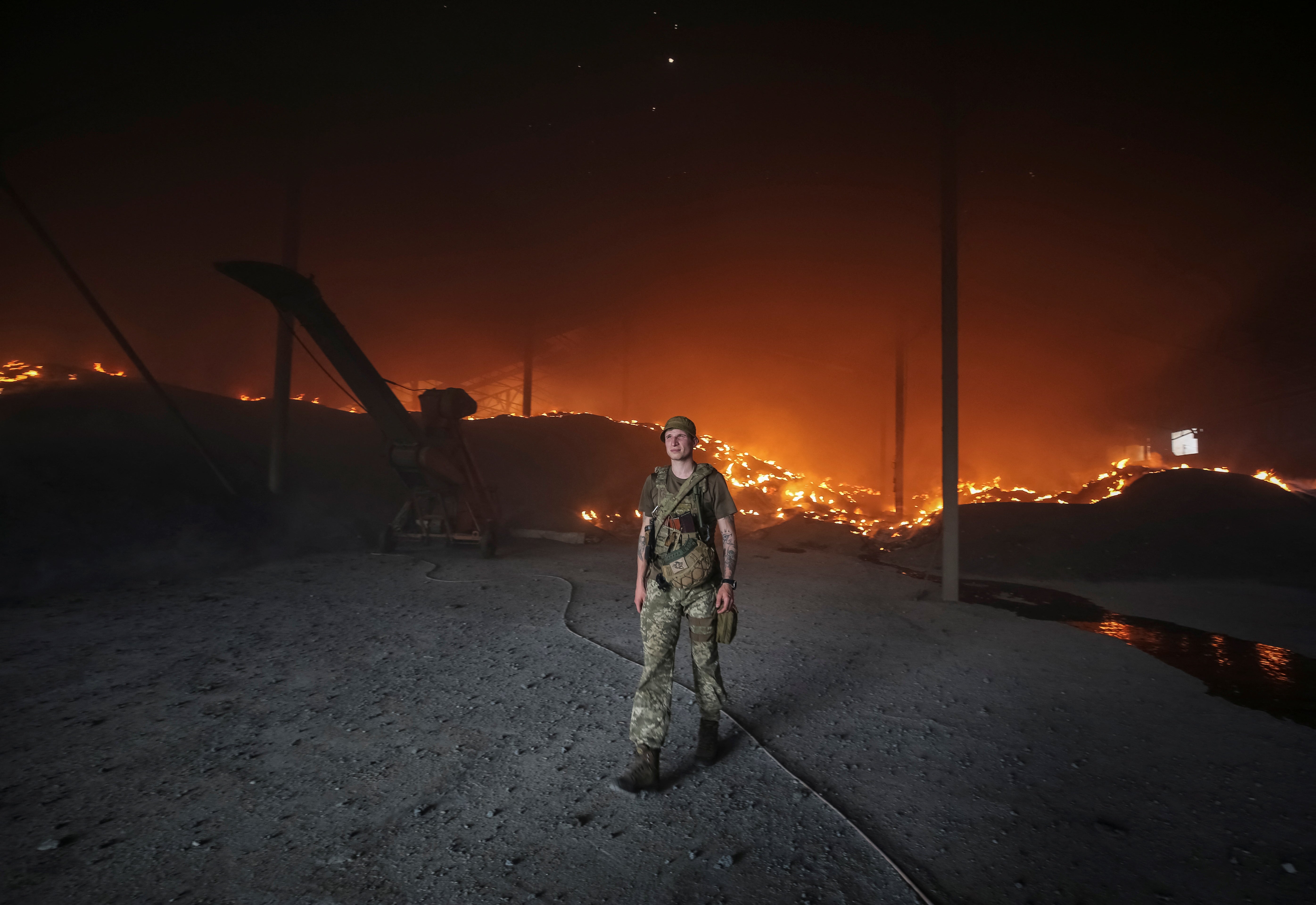
Amid the carnage, bloodshed and death in Ukraine, a new tragedy is looming, as businesses in the war-torn country increasingly fear that they may soon have to start throwing away food the world desperately needs.
Hopes are fading among Ukrainian business leaders that Vladimir Putin will lift a blockade on the Black Sea ports before the harvest begins in just a few weeks as siloes that are already filled with grain begin to reach capacity.
Russian and Turkish defence ministers have discussed a potential humanitarian corridor to allow grain out of the country by sea, but no deal has been done and time is running out. Further talks are scheduled for Wednesday.
It came as UK farming minister Victoria Prentis called for an immediate investigation into allegations that Russia had been stealing grain.
She told the International Grains Council (IGC) conference in London that she had heard serious allegations of grain theft first-hand from sources in Ukraine’s southern region of Kherson. Ukraine has accused Russia of selling the stolen food to Turkey, an allegation that the Kremlin denies.
Meanwhile, Ukraine’s farmers and logistics firms are fighting an increasingly desperate battle to export food by road and rail, amid surging prices for fuel and a shortage of trucks and drivers – many of whom are now fighting off Russian forces on the front line.
This week, the US accused Putin of using food to “blackmail” the world after the Kremlin said it would consider opening up a humanitarian corridor only if western sanctions on Russia are lifted.
The winter harvest, which starts in July, could see storage capacity exhausted unless the ports opened. That outcome could see a further surge in prices for staple products such as wheat, which Ukraine is a leading exporter of.
If a deal is not reached, the world could suffer food shortages, with parts of Africa and the Middle East particularly exposed, the UN has warned.

Anastassia Sobotiuk, director of MHP, one of Ukraine’s leading agribusinesses said many producers are now only able to export “insignificant” amounts of grain on trucks and railways.
“The biggest problem all exporters or logistics companies are facing is a shortage of diesel in Ukraine. The price has jumped by around 70 per cent,” said Sobotiuk.
Shifting goods by railway is “very challenging” because Russian rockets continue to destroy infrastructure including tracks and bridges. The passage is further complicated because Ukraine uses a Soviet railway gauge wider than neighbouring countries, meaning goods have to be removed and re-loaded at the border.
“For companies like ours it takes additional time to deliver the products either to the border of Ukraine or to the final customer or to the port, as new routes have to be developed in this case,” said Sobotiuk.
MHP has chartered a ship which can carry 6,500 tonnes of vegetable oil from the port of Reni up the Danube river. But this takes five days to fully offload, and the route is subject to delays.
The limited number of safe roads out of Ukraine are overloaded with trucks frequently forming lines many kilometres long. Meanwhile, there are not enough trucks or drivers and it currently takes up to five months to train and licence new ones.
Only 10 per cent of vegetable oil trucks and 5 per cent of grain trucks with licenses are currently available, according to MHP’s estimates.
“Today this is not that visible, however, during the harvesting time, from July, that will become a real problem. Grains have to be delivered to storage and then delivered to the ports but many of the drivers who would do so are fighting.”
Ukrainian agribusinesses often struggle to find enough drivers during the busiest season between September and November but problems are expected to be much worse this year.
Newly harvested grain and a backlog of millions of tonnes in storage both need to be moved with fewer workers and major logistical problems caused by the war.
International efforts are ramping up to relieve the situation and open Ukraine’s ports but as yet there has been limited progress.

Ukraine and Poland agreed a deal last month to lessen checks on food at the border, which businesses say has improved the situation.
MHP is calling for more vets and phytosanitary staff at the borders working 24/7 rather than eight hours a day on weekdays.
Food exporters are also urging the agreement of a “green” corridor, or fast-track customs lane that will allow crucial products like poultry, meat and vegetable oils. “The whole world needs it,” says Sobotyuk. “People need food.”
Alex Lissitsa, president of the Ukrainian Agribusiness Club and chief executive of food company ICM, reported widespread destruction and theft by Russian forces that he believes has been so coordinated that it must have been ordered by the Kremlin.
Many fields lay untended to because they are in areas currently or previously occupied by Russian forces, meaning they could be mined, Lissitsa said
“Farmers are scared and they have no idea what to do. There is no domestic market for their produce and with no income they can’t start to prepare for the new season.”
Lissitsa said the country urgently needs a huge amount of fuel to help transport goods out by road as well as a ramping up of efforts to reduce bureaucracy at the border.
Despite the dire situation, he, like many Ukrainians remains adamant that the country cannot negotiate with Putin.
“What Putin says and what he does are totally different,” said Lissitsa.
Or, as Sobotiuk put it: “How can you trust a terrorist?”







